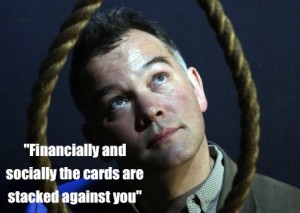In preparation for writing this post, I googled Stewart Lee. His official website, http://www.stewartlee.co.uk/ came up as the first hit, and amongst the links for media clips, tour date tickets, and Stewart Lee merchandise, what kept flashing up, right under an ad for his latest tour, were a variety of “reviews” he’s received from the internet. A few examples include,
He’s a self-impressed, patronising, up-his-own arse, condescending twat.
– Vagabond, b3ta.com
Stewart Lee: You are not funny. Almost a Dane Cook level of NOT funny.
-May Pescante, Twitter
Please Mr Lee do humanity a favor and scuttle back under your rock
– Charles, North Carolina, Dailymail.co.uk
“I hope stewart lee dies.”
– Idrie, Youtube
This one was particularly interesting, especially after comments in class on Wednesday about how the repetitive nature of his last bit became unfunny rather quickly.
A heckler could destroy his entire act simply by shouting “we get the fucking picture” from the back of the room in the first 5 minutes.
– Dirtbox, eurogamer.com

It seems that Lee has garnered quite a bit of negative criticism for coming off as a self-righteous jerk, but sometimes it works for him. The point I’m trying to make here, is that going to a comedian’s official website and finding a bunch of reviews that call him every terrible name possible (the ones above are tame compared to some of the rants featured) is absolutely funny. He is playing off of what these people are saying in their reviews and showing them that he simply doesn’t care that they say mean things about him.
I personally found Stewart Lee rather funny at times, and didn’t feel that the bit at the end was overlong or forced, but I also recognize that I just didn’t get a lot of his other jokes, possibly because I’m not British, but also possibly because they simply weren’t funny, or perhaps because a lot of them were rather bleak.
Here’s another clip from Comedy Vehicle with some of the intercuts that everyone seemed to like a bit more than his stand-up, even including a clip of Hitler and a fake news program that calls his own jokes terrible.
http://www.youtube.com/watch?v=AXHq0F4nG5A&feature=related

